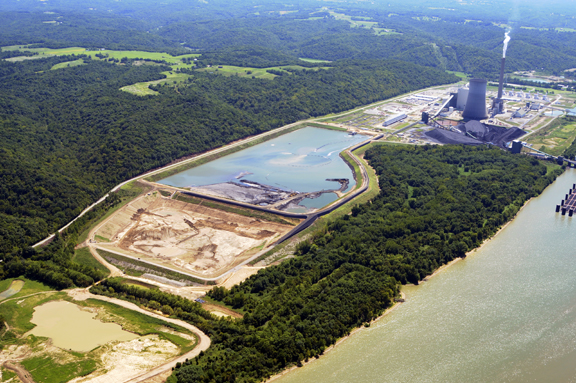December 28, 2016 – by James Bruggers in the Louisville Courier Journal

LG&Es Trimble power plant sits adjacent to the Ohio River near Bedford, KY. Shown in this picture is the coal ash facility in the foreground which ran out of space. LG&E is wanted to open another massive coal ash facility to the upper left in this picture over some karst limestone formation including a rather large cave. Valley Watch, Sierra Club and Save The Valley objected and won in an administrative procedure in 2011. Photo © 2010 BlairPhotoEVV
After being the target of critical editorials in Kentucky’s two largest newspapers, Kentucky’s Energy and Environment Cabinet fired back Thursday with an internet posting that argues its proposed rules for coal combustion waste actually strengthen – not weaken – protection of the environment and public health.
The Naturally Connected blog from the Kentucky Department for Environmental Protection also takes aim at the media, arguing news coverage and editorials “mislead readers about the rules’ intent and potential effect on the health and welfare of Kentuckians.” By incorporating new regulations on the management of coal-burning wastes from the U.S. Environmental Protection Agency, Kentucky DEP argues, “the proposed state regulations would maintain and in some cases increase environmental and public protections, not diminish them.”
But one of the state’s top environmental attorneys quickly countered that it is state officials who are misleading the public with Orwellian arguments along the lines of “war is peace” and “ignorance is strength.”
Attorney Tom FitzGerald, director of the Kentucky Resources Council and an expert on Kentucky waste laws, called the state’s argument “pure sophistry,” which means the use of fallacious arguments, especially with the intention of deceiving.
The new EPA based rule came after decades of fighting nationally over how ash and scrubber sludge should be handled. Coal ash contains contaminants like mercury, cadmium and arsenic, according to the EPA, and without proper management, these contaminants can pollute waterways, groundwater, drinking water, and the air.
►CJ EDITORIAL: Kentucky shouldn’t ease coal ash rules
►H-L EDITORIAL: Don’t weaken coal ash rules
Kentucky, among the nation’s biggest coal-burning waste generators, argues that the proposed regulations will require managing dust and storm water as well as monitoring groundwater and other requirements. DEP went on to say the agency “has and will exercise its authority to inspect these facilities to ensure compliance, investigate citizen complaints, and take enforcement action as necessary.”
But the state’s blog posting failed to detail that it is ditching its long-standing public permit process for new coal ash landfills and ponds, eliminating oversight by the cabinet’s solid waste experts – and involvement by citizens – when it comes to deciding where and how those facilities can be constructed.
FitzGerald took to Facebook to write: “Inspection and enforcement capability, which already exists, is no surrogate for a permitting system with individualized agency and public review of proposed (coal combustion residual) impoundments and landfills, and the existence of stronger standards developed by EPA is greatly compromised if the utility industry is allowed to locate, build, and operate landfills and impoundments for disposal of coal combustion wastes without any prior agency review and approval or public scrutiny.”
The Courier-Journal has detailed how even one of the cabinet’s own veteran geologists has objected to the new permitting process, testifying as a private citizen that it would shut out the cabinet as well as the public during a critical time – and would likely force the cabinet to return tens of millions in financial assurances utilities have provided in the form of bonds to make sure existing and future coal ash facilities will be properly cleaned up and closed in the event of utility bankruptcies.
The cabinet posting went on to say that it is developing the regulations to get rid of redundancies and inconsistencies between overlapping state and federal rules that could cause confusion, and has been taking public concerns into account.
For his part, FitzGerald writes that the proposal is “reckless, and will likely result in greater conflict, litigation, and higher costs to electric utility ratepayers when something is discovered after the fact to be wrong with the siting, design, construction, or operation of the landfill or impoundment that could have been prevented had there been a permit review process.”
Reporter James Bruggers writes this Watchdog Earth blog. Reach him at (502) 582-4645 and at jbruggers@courier-journal.com.
